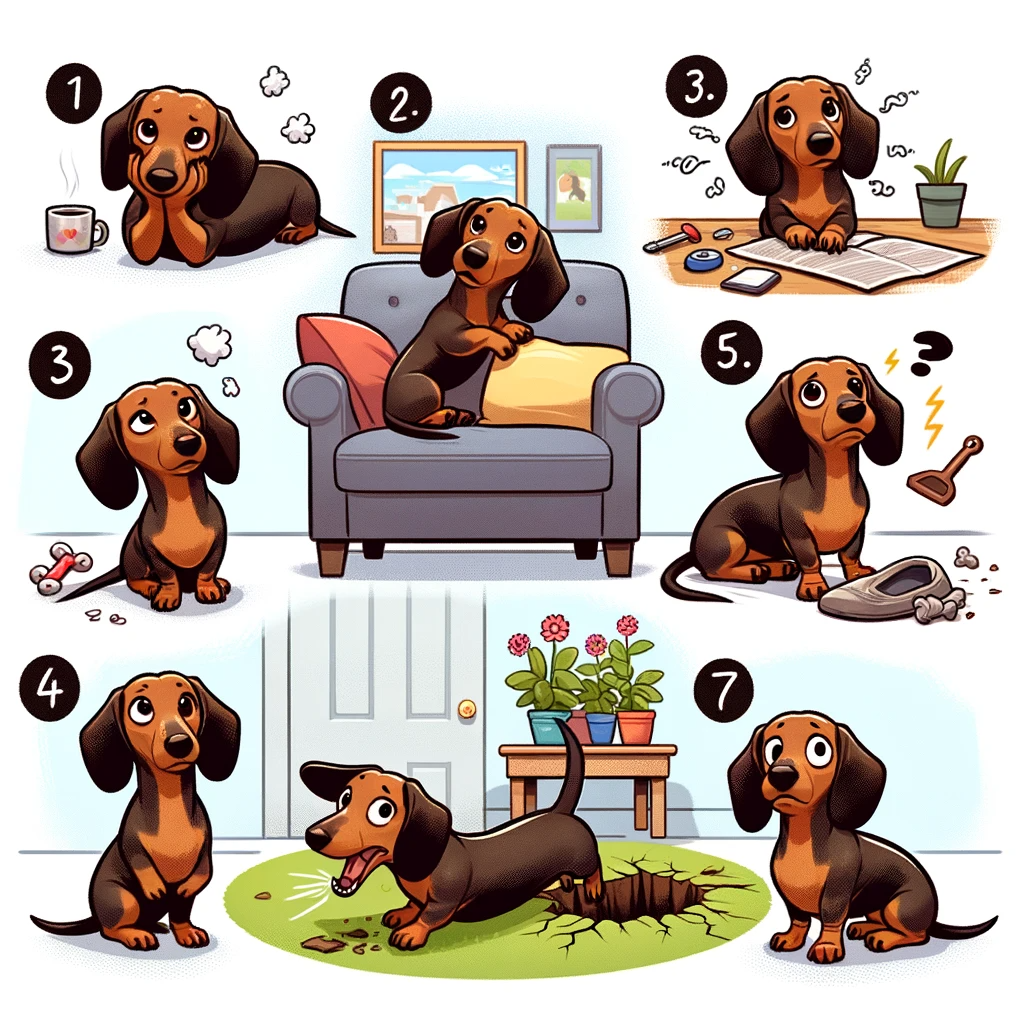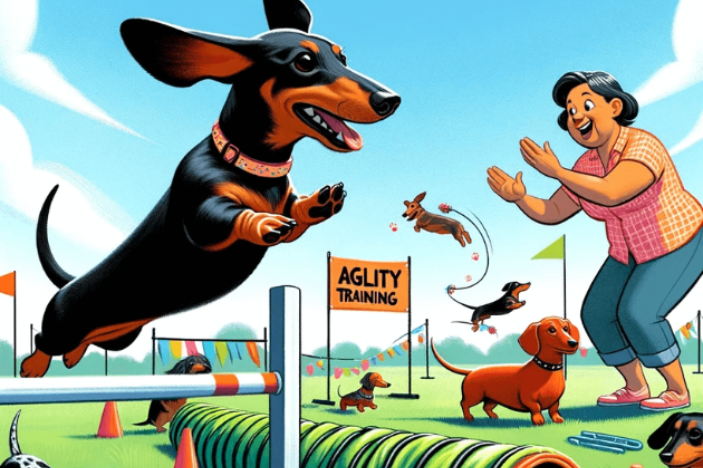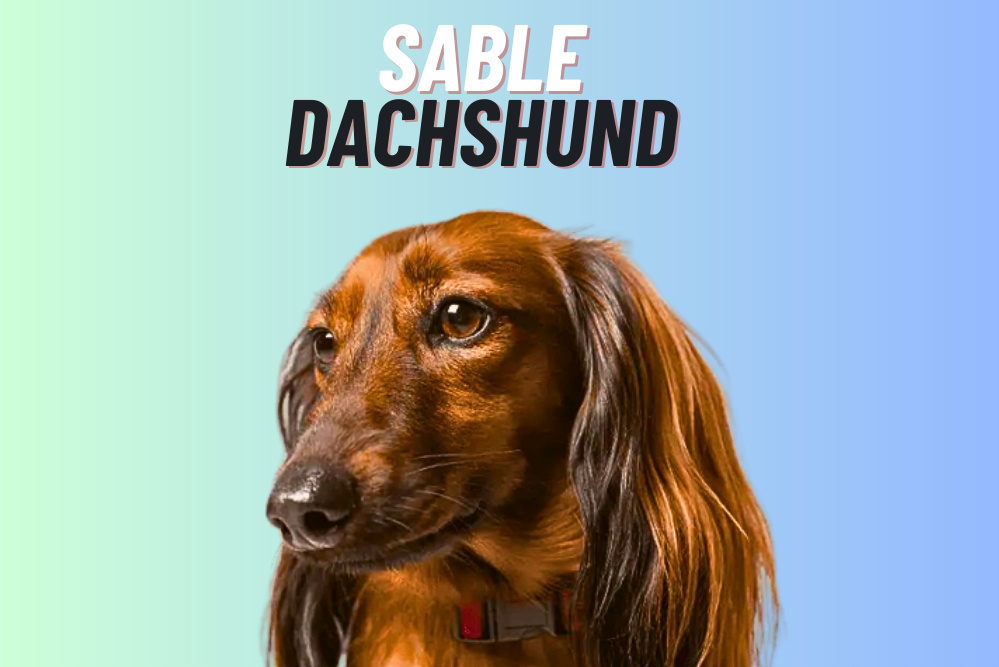Train and Handle Senior Dachshunds
Dachshunds, like all dogs, require proper training and care to live happy and healthy lives. As they age, they may require some adjustments to their training and care routines.
Here are some tips on how to train and handle aging Dachshunds.
Exercise
As Dachshunds age, they may become less active and more prone to weight gain, which can lead to health issues.
It’s important to provide regular exercise, but be sure to adjust the intensity and duration of exercise to accommodate their age and physical abilities.
Diet
Aging Dachshunds may have different dietary requirements than younger dogs. Consult with your veterinarian about the best diet for your dog’s age and health.
Regular Check-Ups
Regular visits to the vet are essential for monitoring your aging Dachshund’s health and detecting any potential health issues.
Comfort
Provide comfortable and supportive bedding for your aging Dachshund to reduce the risk of joint pain and discomfort.
Positive Reinforcement
Positive reinforcement training methods are effective for dogs of all ages, including aging Dachshunds. Reward good behavior with treats and praise to encourage desired behavior.
Consistency
Consistency is important in training aging Dachshunds. Stick to a regular routine for feeding, exercise, and training to help your dog feel secure and comfortable.
Patience
Aging Dachshunds may experience cognitive decline, hearing and vision loss, and other age-related changes that can affect their behavior and abilities. Patience and understanding are essential when training and handling an aging dog.
Remember to always consult with your veterinarian before making any significant changes to your aging Dachshund’s diet or exercise routine. With proper care and attention, your aging Dachshund can live a happy and healthy life.
THINGS YOU SHOULD KEEP IN MIND REGARDING A SENIOR DACHSHUND
In Diet Less Fat
A senior dachshund needs lean protein and fiber in a balanced diet. To stay healthy, overweight or obese dogs may need to cut calories.
Hypoglycemia and liver failure can result from a fat-free diet in this age group. While a senior dachshund may require more calories than a younger dog to maintain their weight, it should still be given a diet that is lower in fat. Still, It is best to consult your vet.
More Protein
A senior dachshund’s diet should include fresh, healthy food, but you may want to add protein. They will be able to maintain their muscle mass and stay motivated all day long thanks to this.
A senior dachshund’s diet should consist of 16 to 18% protein and 5 to 7% Fat, which is suitable for their age.
Feed them a variety of humanely raised meats, eggs, cottage cheese, and other high-protein foods. Fresh fruits and vegetables are also recommended daily to help keep your pet healthy and hydrated.
Add Joint Supplements
As the age increases it gets tough to handle and train dachshunds due to their weak bones and declining abilities. However one can not give up on dogs as there are numerous ways you can solve this issue too.
Senior dachshunds may benefit from joint supplements. In addition to providing the nutrients that are essential for joint health, these supplements often contain Glucosamine and chondroitin sulfate.
Chondroitin sulfate regulates glycosaminoglycan production, while glucosamine maintains cartilage hyaline tissue. Glucosamine and chondroitin supplements for dogs have had mixed results in studies.
Given the lack of research on senior dachshunds, adding this supplement to their diet may still be beneficial. Ask your vet if your dog needs joint supplements.
Keep In Mind Running And Jumping Is Dangerous For Senior Dachshunds
Yes, this is true. Running and jumping can be very dangerous for senior dachshunds, because their bones may not be strong enough to withstand the impact of these activities.
Similarly, jumping can also cause direct damage to your dog’s joints by increasing the pressure on them due to your dog’s body weight.
Therefore, if the dog is older and you want to engage it in any form of exercise that requires jumping or running, it is essential to visit a physician to assess whether or not it is safe.
Ensure that you always wear appropriate footwear when partaking in these activities so that you do not sustain injuries in the future.
Senior Dachshund Needs Exercise But Not Hard Exercise.
One of the most common concerns that senior dogs face is difficulty getting enough exercise. Age, weight gain or loss, weakening muscles, and movement limits from arthritis or other health issues can cause this. However, there are ways you could train and handle aging dachshunds even in this situation that is because of the playful nature of dogs.
If your senior dog is healthy but needs more exercise than you can give him on walks or playtime, there are numerous methods to do so. An indoor dog house allows him to roam and explore. He can also exercise in a lightweight jogger/walker hybrid vehicle on your land.
MOST AGED DOGS FIGHT MAJOR DISEASES
Hip Dysplasia
Most senior dogs fight hip dysplasia just like younger dogs. Hip dysplasia is a disorder where the thigh bone and pelvis do not fit together properly at the ball-and-socket joint.
This will cause joint pain and problems moving around easily. There are many things that can be done to help prevent or treat hip dysplasia, but one of the best ways to go about it is by regularly providing your dog with bone broth as part of their diet.
This drink contains all of the essential nutrients and minerals needed for healthy joints, including collagen, glucosamine sulfate, chondroitin sulfate, sodium bicarbonate (to maintain pH balance), and vitamin C. It is important to make dachshunds used to it and handle and train
Dental Disease
Although dental disease affects most elderly dogs, there are ways to reduce the risk.
- The first step is to wash your dog’s teeth at least twice a week and give them enough water to keep their mouths wet.
- If your dog has tartar buildup on their teeth, you may need to give them an acidulated solution like toothpaste or mouthwash several times a week to absorb it. Dental disease affects most senior canines.
- They can’t wash their teeth as often or eat chewy items like bones and rawhide. If your dog has dental problems,
- Finally, periodic dental cleanings and checkups will maintain their teeth healthy and infection-free.
Seizures
While seizures are always a concern for senior dogs, the majority do not experience them. If your dog has had one seizure in the past year, it is recommended that you seek veterinary attention as soon as possible.
Age, sex, breed, and diet are just a few of the variables that can affect whether or not a dog will experience seizures. There is no known cure for epilepsy (a condition characterized by recurrent unprovoked seizures), but there are many treatments available that may help to improve the quality of life for your pet.
Some common treatments include medication (such as phenobarbital or carbamazepine) and surgery (such as vagus nerve stimulation). It is also important to keep track of any changes in behavior or mood and bring these up with your veterinarian at an early stage so that they can be assessed and appropriately treated if necessary.
Diabetes
Many senior dogs do in fact have diabetes and it’s important to be aware of the signs. If you notice any of the following symptoms in your dog,
Visit a vet for decreased hunger, excessive thirst or urination, weight loss despite exercise, and weak or shaking hindquarters when walking (indicating poor muscle function).
Heart Problems
As a dachshund ages, it becomes more prone to catching multiple diseases, heart disease is one of them.
Beware of elderly dog heart disease.
Beware of elderly dog heart disease. If untreated, heart problems can be fatal. Senior dogs can develop heart disease due to genetic vulnerability, obesity, lack of exercise, and high-fat food.
If your elderly dog has signs like shortness of breath or bloody coughing, see your vet immediately. and Always check up on your older pet for heart disease and treat it immediately
Declining Hearing Ability.
This is not a complete list of aged dog issues, but it may help. One common problem that aged experience is declining hearing ability. This can often occur as a result of age-related damage to the inner ear or from exposure to loud noises.
If your senior dog experiences difficulty hearing you, he may become aggressive or anxious in response. He might also start to wander off and ignore commands, which could lead to accidents if left unsupervised.
Please notify your vet promptly if your elderly dog’s hearing changes his behavior.
Senior Dachshund Mental Health
Senior Dachshund Mental Health is caused by less worry and tension as they mature, making them more relaxed and confident.
it’s important to give them plenty of mental stimulation so that they don’t get bored or feel left out. Dog-sledding, hiking, playing ball with other pets, and walking help keep elderly dogs cognitively engaged and happy.
Senior Dachshund Love and Give Extra Time and Care.
Some senior dachshunds may love to give extra time and care, but this is not always the case. These actions may indicate that your dog wants attention or more security than you can provide.
Their loving nature makes it easy for the owner to train and handle aging dachshunds when they grow old. In this case, it might be best to re-home the pet rather than try to fix things at home.
Dachshunds are generally very affectionate and love to spend extra time caring for their family. You can take them for a walk or join them in their recreational activities.
Senior Dachshund Vet Checkups
Your vet’s advice depends on your senior dachshund’s health. However, most vets would suggest that you schedule a vet checkup at least once every month.
How to Keep Your Dachshund Healthy.
When it comes to keeping your elderly Dachshund healthy, there are a few things you can do to help:
- Feeding your Dachshund a varied diet will help keep them active and healthy.
- Exercise them regularly – Dachshunds need exercise to stay mentally and physically active.
- Keep them warm – keeping warm will help reduce joint pain and promote better health.
Make Them Stay Away From Water Obstacles
Dachshunds love to play in the water, so be sure to keep any potential water obstacles out of his reach. Fences, steps, and low-hanging objects can be used as toys or climbing steps for them.
Regularly Check Your Dachshund’s Temperature
Checking your dog’s temperature is crucial to his health. Get him a digital thermometer or go for a walk. Always accurately measure his temperature. If it falls below the safe range, you should call your veterinarian right away!
How to Reduce the Risk of Disease?
- Avoiding dangerous orders and behaviors will help protect your young dachshund from infections like rabies and distemper.
- Don’t let him go someplace he doesn’t know humans or dogs and doesn’t touch him without rabies and distemper shots
- Avoid giving him new stuff like bird seeds or wild animals, which may contain deadly viruses.
Conclusion
If you’re looking for an affordable, healthy pet, consider keeping a Dachshund. With careful care and some common sense, you can keep your Dachshund healthy and safe.
Additionally, it’s important to remember that aging is a natural process and your pet should be treated with respect, love, and care. By following these tips, you can ensure that your Dachshund remains happy and healthy into her senior years.




